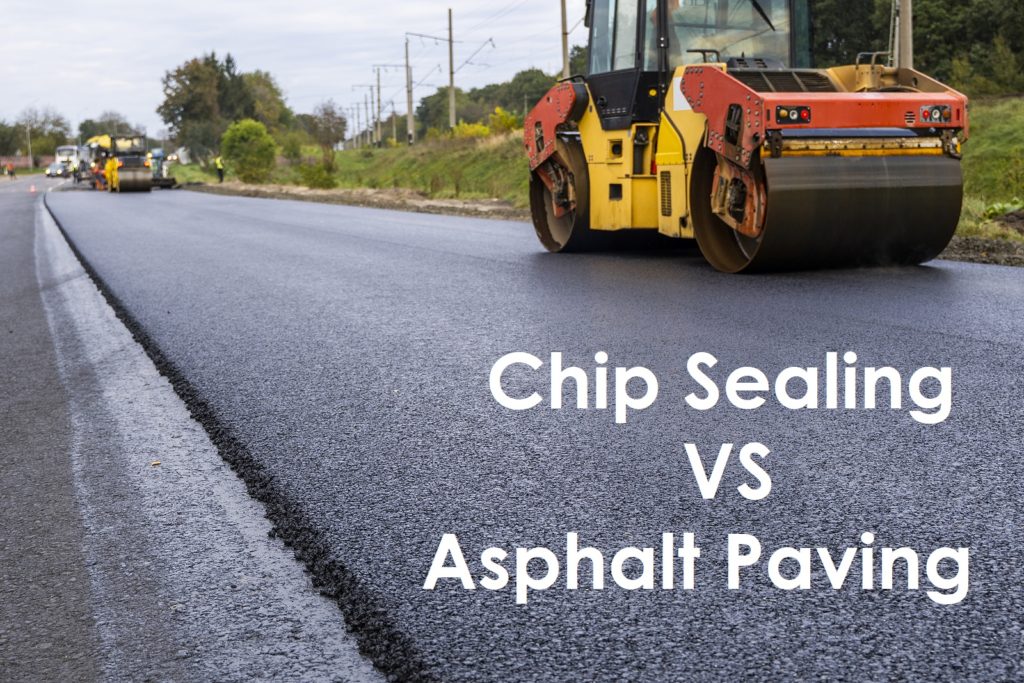Deciding between chip seal and asphalt paving in Indianapolis is not an easy decision unless you have educated yourself on the fundamentals of both pavement protection methods. If you are wondering how chip seal compares to asphalt paving, it might help to review some frequently asked questions about both materials.
Continue below to review some FAQs about chip seal and asphalt paving, including who to trust for superior commercial and industrial pavement construction in Indianapolis Indiana.

Frequently Asked Questions
How Do I Know Which Paving Material Is Right for My Property?
It is important to consult with a professional Indianapolis paving contractor so they may assess your property and determine which paving material is best for your paving applications. Such factors they will consider include your soil conditions, the property location, regional climate, land grade, average traffic patterns, and water drainage.
What is Chip Sealing? What is Asphalt?
Many people are confused about the differences between chip seal and asphalt paving because the material others are quite similar. Chip seal, also known as tar and check pavement, retains many of the same properties as hot liquid asphalt.
However, the primary difference between the two types of paving materials is their application compatibility. In simplest terms, conventional asphalt mix is poured and spread onto a base of aggregate while still hot, and then compacted or rolled down into a solid, unified surface.
Similarly, chip sealing also involves the use of hot liquid asphalt, however the hot asphalt is sprayed onto a base of aggregate rather than poured and dispersed. Then, chips are added to the surface of the asphalt mix while it is still warm, and then compacted into a cured state.
Which is Better for My Paving Application?
If you were to drive over pavement constructed with asphalt, and the pavement constructive chip seal, you probably would notice a difference. However, when you need asphalt paving, it is important to learn which type of asphalt paving method is better for your application. For instance, chip sealing is often reserved for covering existing asphalt with minor damages like cracks and small potholes. Hot asphalt paving is generally reserved for new pavement installations and invasive or comprehensive repairs.
How Does Chip Sealing and Asphalt Paving Compare in Terms of Durability?
Asphalt is a thicker, denser material, and therefore, able to withstand natural wear and tear at a much higher level of resistance. Chip sealing is applied over existing pavement to fill in cracks and small holes, thus rendering a smooth, refined surface. Because chip seal is spray-applied in thin layers, it is not as durable and long-lasting as hot mix asphalt pavement. The general rule of thumb in terms of lifespan for asphalt is years, while chip seal is said to require reapplication after 7 to 15 years.
How Much Does Chip Seal Cost Compared to Conventional Asphalt?
As mentioned, chip seal does not last as long as traditional asphalt because it is applied in a thinner coat. Therefore, chip seal needs to be reapplied every 7 to 15 years, depending on relevant external factors and regional elements. For these reasons, chip seal needs to be reapplied two or three times before traditional asphalt would require a repair or overlay. This means that, although chip seal is cheaper, because you pay for multiple chip sealing jobs within the same time you would pay for one asphalt job, the costs are quite similar.
Does your commercial property or parking lot have some potholes that need patched up or repaved? Contact ACI Asphalt and Concrete at 317-549-1833 for commercial pothole repair and asphalt paving services in Indianapolis, Indiana.
You Should Also Read:
Coal Tar-Based Seal Coats Versus Asphalt-Based Seal Coats
What is Recycled Asphalt Pavement?
4 Seal Coat Options for Asphalt Pavement Protection

